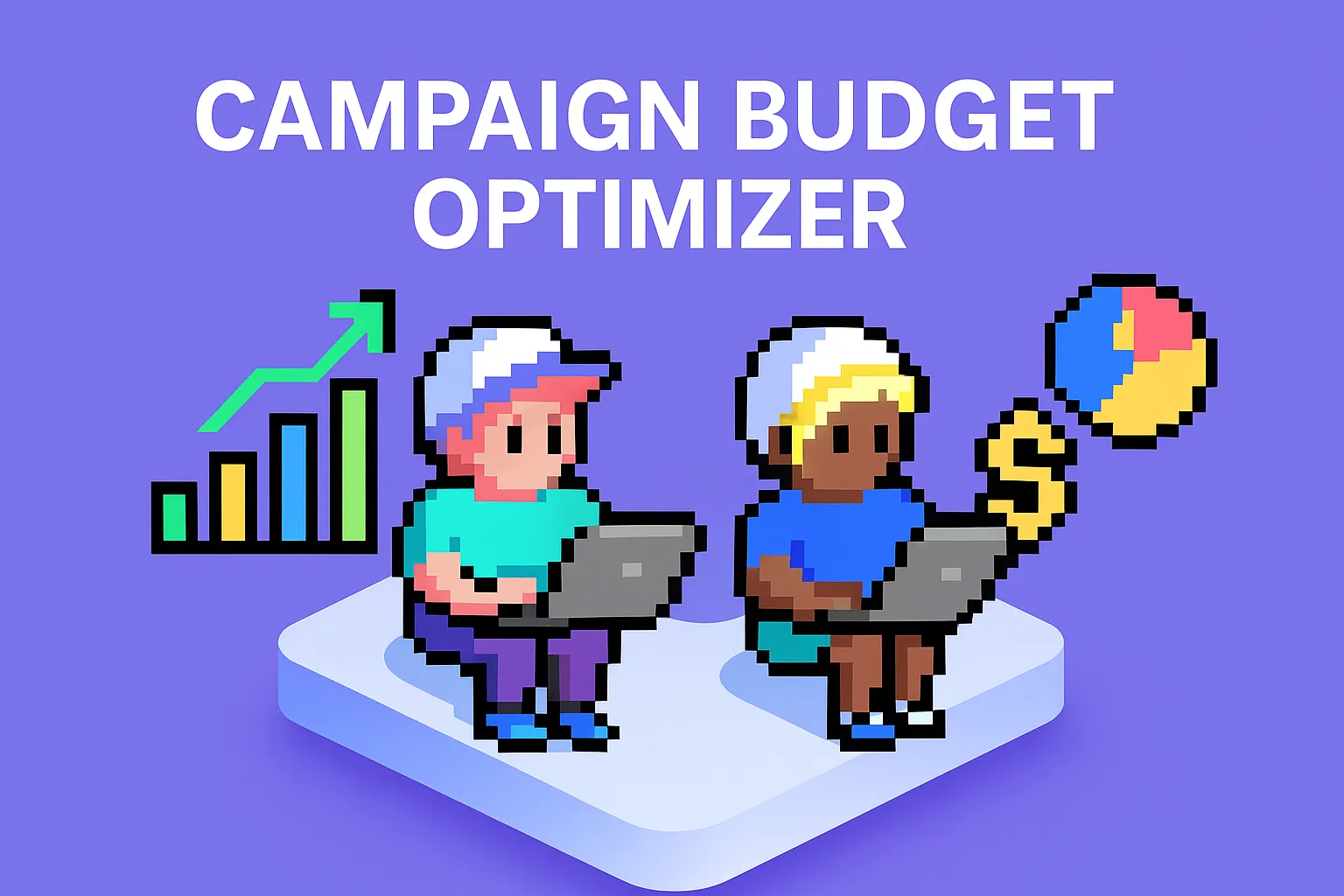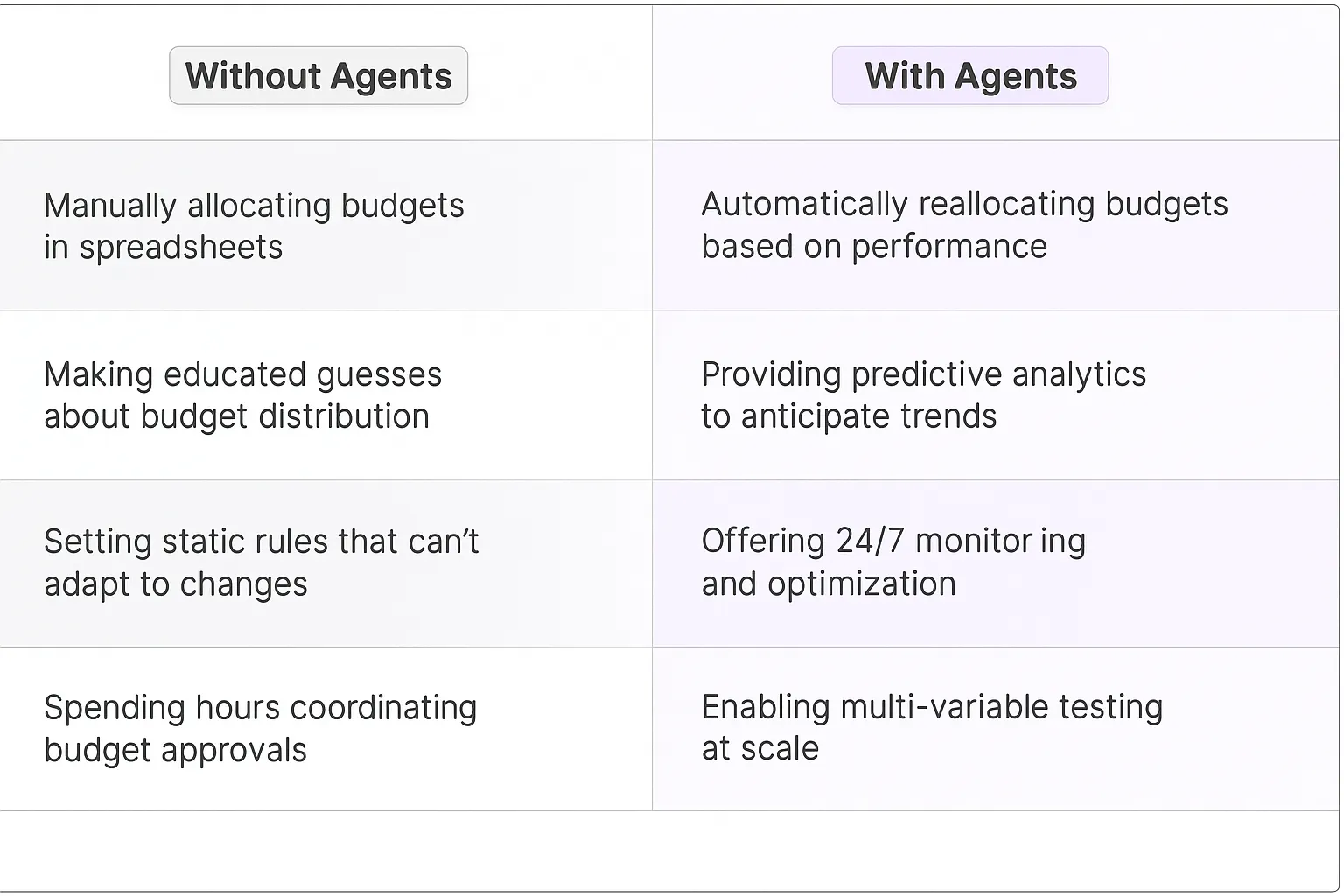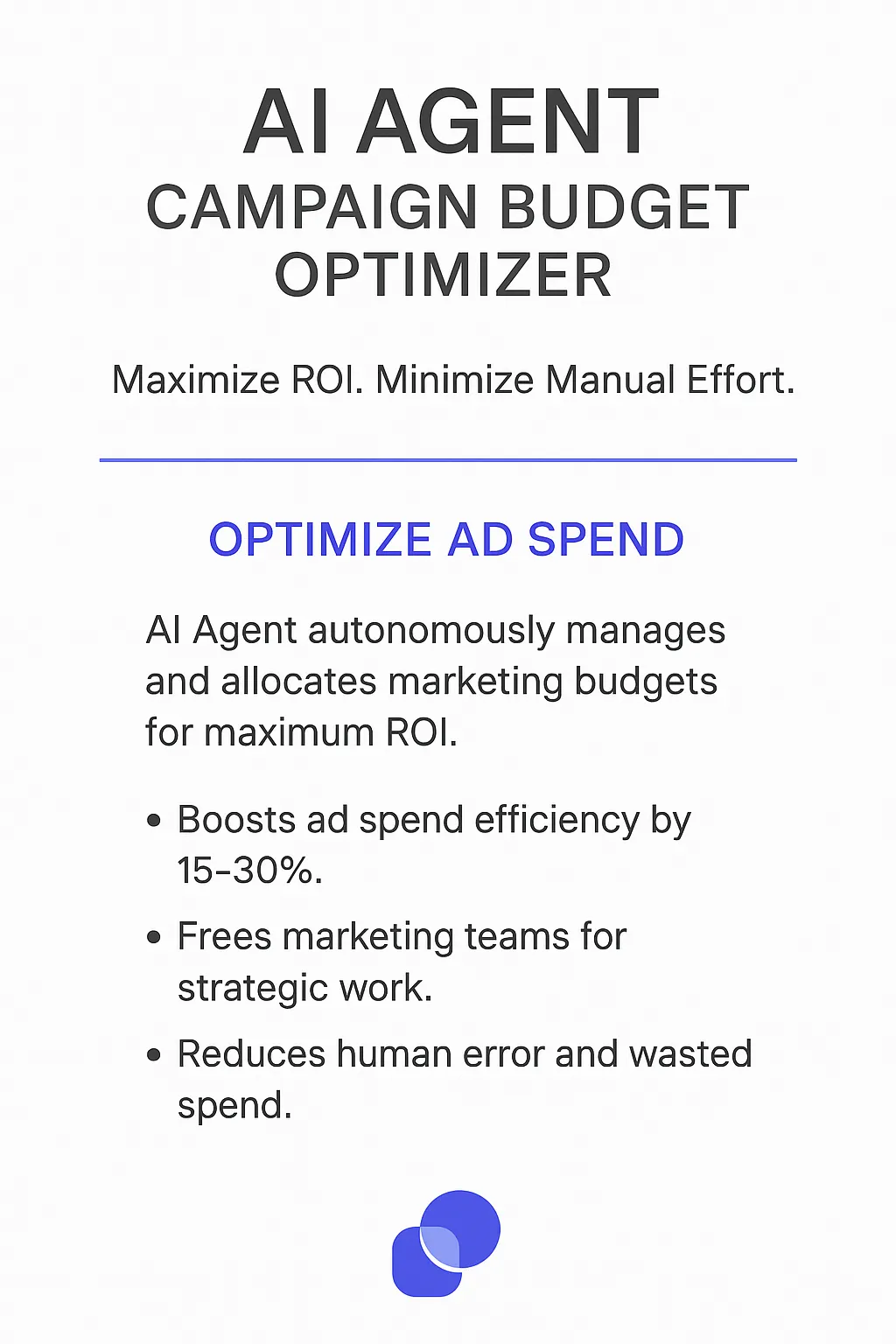Campaign Budget Optimizer AI Agents
Understanding AI-Powered Campaign Budget Management
Campaign Budget Optimizer is an AI-powered system that dynamically manages and distributes marketing budgets across various advertising channels. Unlike traditional budget management tools, it uses machine learning algorithms to analyze performance metrics, market conditions, and historical data to make real-time spending decisions. The system continuously learns from campaign outcomes, building increasingly sophisticated models that understand nuanced patterns in consumer behavior and market dynamics.
Key Features of Campaign Budget Optimizer
- Real-time budget allocation across multiple advertising platforms
- Advanced predictive analytics for anticipating market trends
- Machine learning algorithms that improve with each campaign
- Multi-variable testing capabilities
- Automated performance monitoring and adjustment
- Cross-channel optimization and spend analysis

Benefits of AI Agents for Campaign Budget Optimizer
What would have been used before AI Agents?
Marketing teams traditionally relied on manual budget allocation processes that were both time-intensive and prone to human error. They'd spend hours in spreadsheets, analyzing historical performance data, and making educated guesses about budget distribution. The reality was messy: a mix of gut feelings, basic automation rules, and weekly adjustments that often came too late to capture market opportunities.
Campaign managers would typically need to:
- Manually review performance metrics across multiple channels
- Create complex Excel formulas to calculate ROI
- Set static rules that couldn't adapt to real-time market changes
- Coordinate with team members across time zones for budget approvals
What are the benefits of AI Agents?
The integration of AI Agents into campaign budget optimization creates a fundamental shift in how marketing teams operate. These digital teammates process vast amounts of data points in real-time, identifying patterns that humans simply can't spot.
Key advantages include:
- Dynamic budget reallocation based on real-time performance metrics, ensuring money flows to the highest-performing channels automatically
- Predictive analytics that anticipate market trends and adjust spending before competitors catch on
- 24/7 performance monitoring and optimization, eliminating the lag time between performance changes and budget adjustments
- Multi-variable testing that considers thousands of combinations simultaneously
The most compelling aspect is how AI Agents learn from each campaign's performance. They build sophisticated models that understand seasonal trends, competitive dynamics, and audience behaviors - creating a compound learning effect that gets stronger over time. This isn't just about saving time; it's about unlocking performance improvements that weren't possible with human-only teams.
What's particularly fascinating is the network effect: as more marketers use these AI Agents, the collective intelligence of the system grows, benefiting everyone in the ecosystem. It's a classic example of increasing returns to scale in software - something we rarely saw in traditional marketing optimization tools.

Potential Use Cases of AI Agents with Campaign Budget Optimizer
Processes
- Real-time budget reallocation across multiple ad platforms based on performance metrics and ROAS
- Dynamic bid adjustments for different audience segments and demographics
- Cross-channel budget distribution optimization between search, social, and display campaigns
- Seasonal trend analysis and proactive budget planning
- Competitor spend pattern analysis and strategic budget responses
Tasks
- Daily performance monitoring and automated budget pacing adjustments
- Identification of under-performing campaigns and automatic fund reallocation
- Creation of detailed budget forecasts based on historical data and market conditions
- A/B testing budget strategies across different geographic regions
- Emergency budget adjustments during viral moments or unexpected spikes
- Automated reporting on budget efficiency and optimization recommendations
The Growth Loop Perspective
When we look at campaign budget optimization through the lens of growth loops, we're really talking about building a self-reinforcing system. The digital teammate becomes your strategic partner in creating these loops, continuously learning from campaign performance data to make increasingly sophisticated budget decisions.
The most effective implementations I've seen treat budget optimization not as a set-and-forget tool, but as an integral part of the growth stack. These AI agents excel at identifying micro-opportunities - those small budget adjustments that compound over time into significant performance improvements.
What's particularly fascinating is how these digital teammates can process complex, multi-variable decisions in milliseconds. They're analyzing conversion rates, customer acquisition costs, and lifetime value predictions simultaneously, making budget decisions that would take human teams hours to calculate.
The key differentiator between good and great implementation is the ability to balance short-term performance optimization with long-term strategic goals. The best AI agents don't just chase the highest immediate ROAS - they understand the nuanced relationship between brand building and performance marketing spend.

Industry Use Cases
Campaign Budget Optimizer AI agents represent a significant shift in how marketing teams allocate and manage their advertising spend. The versatility of these digital teammates in campaign budget optimization makes them valuable across various industries, each with unique challenges and opportunities in their marketing efforts.
What's particularly fascinating is how these AI agents have evolved from simple rule-based systems to sophisticated decision-makers that can process complex market signals. They're essentially becoming the quantitative analysts of the marketing world, but with the ability to make real-time adjustments that would require an army of human analysts working around the clock.
The real power lies in their ability to identify micro-trends and patterns that human marketers might miss. For instance, when a retail brand experiences a sudden spike in engagement from a specific demographic, these AI agents can instantly redistribute budget to capitalize on that momentum - something that would take traditional teams hours or days to recognize and act upon.
This marks a fundamental transformation in marketing resource allocation, where decisions are made not just on historical data, but on real-time performance indicators and predictive analytics. It's similar to how high-frequency trading changed the financial markets, but applied to the world of digital advertising.
E-commerce: Dynamic Budget Allocation Across Product Lines
The most successful e-commerce companies I've worked with treat their campaign budgets like a living, breathing organism. Take the case of a mid-sized fashion retailer managing 200+ SKUs across multiple platforms. Their marketing team was manually adjusting budgets weekly, but seasonal trends and competitive moves were causing them to miss key opportunities.
A Campaign Budget Optimizer AI agent transformed their approach by monitoring real-time performance signals across Google Ads, Meta, and TikTok. The digital teammate analyzes conversion rates, customer acquisition costs, and inventory levels to make micro-adjustments to campaign spending every 6 hours.
The results were striking: When a particular dress style started trending on social media, the AI agent detected the surge in engagement and automatically reallocated budget from lower-performing categories. This led to a 47% increase in ROAS for that product line while maintaining overall spending limits.
What's particularly fascinating is how the AI agent learned to predict and prepare for demand spikes. It started identifying patterns like payday shopping surges and weather-related buying behavior, preemptively adjusting budgets before these events occurred. This level of predictive optimization would be impossible for human marketers to achieve manually.
The key growth insight here isn't just about automation - it's about capturing micro-moments of opportunity that traditional campaign management misses. When you multiply these small wins across hundreds of products and multiple channels, the compound effect on revenue is significant.
Travel Industry: Multi-Channel Campaign Optimization for Hotels
I recently analyzed how a boutique hotel chain with 12 properties across the US coastal cities completely transformed their marketing spend efficiency. The traditional approach of fixed budget allocation across booking platforms was leaving serious money on the table.
Their Campaign Budget Optimizer AI agent now monitors 15+ booking channels including Expedia, Booking.com, and direct website traffic. The digital teammate processes real-time data on room availability, seasonal events, competitor pricing, and even flight search trends to dynamically shift advertising dollars.
The most fascinating part? The AI agent discovered counter-intuitive patterns human marketers had missed for years. For example, it found that during major tech conferences, allocating more budget to LinkedIn ads in specific cities yielded 3.2x higher booking rates compared to traditional OTA spending.
One particularly clever optimization emerged during shoulder seasons. The AI agent learned to detect early signals of unexpected demand - like weather changes in nearby cities or cancelled flights - and would instantly shift budgets to capture last-minute bookers. This alone drove a 28% increase in occupancy during traditionally slower periods.
The growth loop really kicked in when the AI agent started correlating successful campaigns with guest satisfaction scores. It prioritized channels that not only delivered bookings but attracted guests who gave higher ratings, creating a compound effect on lifetime value.
This isn't just about better ad spending - it's about building a self-reinforcing system where marketing dollars flow automatically to the highest-impact opportunities. The hotels that win in the next decade will be the ones that master this kind of algorithmic advantage.
Considerations & Challenges
Technical Integration Hurdles
Campaign Budget Optimizer AI agents require significant data infrastructure to function effectively. The first major hurdle is connecting these agents to multiple data sources - from ad platforms to analytics tools to CRM systems. Each integration point introduces potential latency and data consistency issues. We've seen teams struggle particularly with real-time data syncing, where even minor delays can lead to suboptimal budget allocation decisions.
Data Quality Dependencies
The effectiveness of budget optimization heavily relies on historical performance data. Many organizations face the "cold start" problem where limited historical data makes initial optimization less reliable. Additionally, seasonal variations and market anomalies can skew the training data, requiring sophisticated outlier detection and data cleaning protocols.
Algorithm Calibration
Finding the right balance between exploration and exploitation remains one of the trickiest aspects. The AI needs to allocate enough budget to test new opportunities while maximizing return on proven channels. Too much exploration burns through budget with minimal returns, while too little means missing potentially valuable opportunities.
Business Rule Integration
Marketing teams often have complex business rules and constraints that need to be encoded into the optimization logic. These might include minimum spend requirements, dayparting preferences, or geographic restrictions. Translating these nuanced business rules into algorithmic constraints without compromising optimization effectiveness requires careful consideration.
Change Management
The shift from manual to AI-driven budget optimization often faces resistance from marketing teams who prefer maintaining direct control. Building trust in the system requires transparent reporting, clear performance metrics, and gradual implementation phases where teams can verify the AI's decisions before giving it full autonomy.
Performance Monitoring
Establishing reliable feedback loops to monitor the AI's performance presents unique challenges. Teams need to develop comprehensive monitoring systems that can detect both obvious failures and subtle degradation in optimization quality. This includes tracking not just ROI metrics but also the diversity of channel allocation and adaptation to market changes.
The Future of AI-Driven Marketing Resource Management
The integration of AI agents with Campaign Budget Optimizer marks a fundamental shift in marketing resource allocation. These digital teammates don't just automate existing processes - they create entirely new possibilities for optimization that weren't feasible with human-only teams. The compound learning effect and network benefits grow stronger over time, suggesting we're still in the early stages of what's possible with AI-driven budget optimization. For marketing teams willing to embrace this technology, the competitive advantage isn't just in efficiency gains - it's in the ability to capture micro-opportunities and respond to market changes at a speed and scale previously unimaginable.













